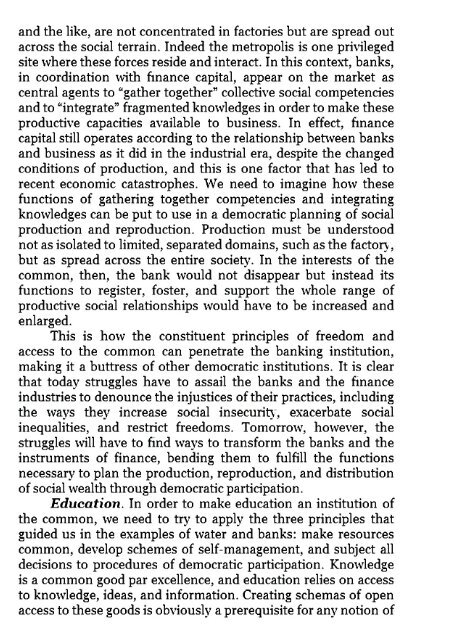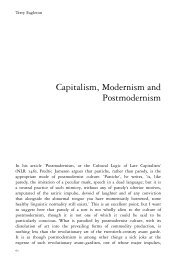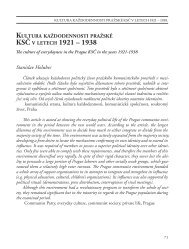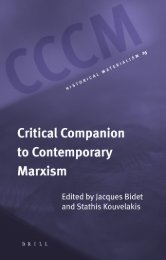Chapter 1: Subjective Figures of the Crisis ... - Negri in English
Chapter 1: Subjective Figures of the Crisis ... - Negri in English
Chapter 1: Subjective Figures of the Crisis ... - Negri in English
Create successful ePaper yourself
Turn your PDF publications into a flip-book with our unique Google optimized e-Paper software.
and <strong>the</strong> like, are not concentrated <strong>in</strong> factories but are spread out<br />
across <strong>the</strong> social terra<strong>in</strong>. Indeed <strong>the</strong> metropolis is one privileged<br />
site where <strong>the</strong>se forces reside and <strong>in</strong>teract. In this context, banks,<br />
<strong>in</strong> coord<strong>in</strong>ation with f<strong>in</strong>ance capital, appear on <strong>the</strong> market as<br />
central agents to "ga<strong>the</strong>r toge<strong>the</strong>r" collective social competencies<br />
and to "<strong>in</strong>tegrate" fragmented knowiedges <strong>in</strong> order to make <strong>the</strong>se<br />
productive capacities available to bus<strong>in</strong>ess. In effect, f<strong>in</strong>ance<br />
capital still operates accord<strong>in</strong>g to <strong>the</strong> relationship between banks<br />
and bus<strong>in</strong>ess as it did <strong>in</strong> <strong>the</strong> <strong>in</strong>dustrial era, despite <strong>the</strong> changed<br />
conditions <strong>of</strong> production, and this is one factor that has led to<br />
recent economic catastrophes. We need to imag<strong>in</strong>e how <strong>the</strong>se<br />
functions <strong>of</strong> ga<strong>the</strong>r<strong>in</strong>g toge<strong>the</strong>r competencies and <strong>in</strong>tegrat<strong>in</strong>g<br />
knowiedges can be put to use <strong>in</strong> a democratic plann<strong>in</strong>g <strong>of</strong> social<br />
production and reproduction. Production must be understood<br />
not as isolated to limited, separated doma<strong>in</strong>s, such as <strong>the</strong> factor}',<br />
but as spread across <strong>the</strong> entire society. In <strong>the</strong> <strong>in</strong>terests <strong>of</strong> <strong>the</strong><br />
common, <strong>the</strong>n, <strong>the</strong> bank would not disappear but <strong>in</strong>stead its<br />
functions to register, foster, and support <strong>the</strong> whole range <strong>of</strong><br />
productive social relationships would have to be <strong>in</strong>creased and<br />
enlarged.<br />
This is how <strong>the</strong> constituent pr<strong>in</strong>ciples <strong>of</strong> freedom and<br />
access to <strong>the</strong> common can penetrate <strong>the</strong> bank<strong>in</strong>g <strong>in</strong>stitution,<br />
mak<strong>in</strong>g it a buttress <strong>of</strong> o<strong>the</strong>r democratic <strong>in</strong>stitutions. It is clear<br />
that today struggles have to assail <strong>the</strong> banks and <strong>the</strong> f<strong>in</strong>ance<br />
<strong>in</strong>dustries to denounce <strong>the</strong> <strong>in</strong>justices <strong>of</strong> <strong>the</strong>ir practices, <strong>in</strong>clud<strong>in</strong>g<br />
<strong>the</strong> ways <strong>the</strong>y <strong>in</strong>crease social <strong>in</strong>security', exacerbate social<br />
<strong>in</strong>equalities, and restrict freedoms. Tomorrow', however, <strong>the</strong><br />
struggles will have to f<strong>in</strong>d ways to transform <strong>the</strong> banks and <strong>the</strong><br />
<strong>in</strong>struments <strong>of</strong> f<strong>in</strong>ance, bend<strong>in</strong>g <strong>the</strong>m to fulfill <strong>the</strong> functions<br />
necessary to plan <strong>the</strong> production, reproduction, and distribution<br />
<strong>of</strong> social wealth through democratic participation.<br />
Education. In order to make education an <strong>in</strong>stitution <strong>of</strong><br />
<strong>the</strong> common, we need to try to apply <strong>the</strong> three pr<strong>in</strong>ciples that<br />
guided us <strong>in</strong> <strong>the</strong> examples <strong>of</strong> water and banks: make resources<br />
common, develop schemes <strong>of</strong> self-management, and subject all<br />
decisions to procedures <strong>of</strong> democratic participation. Knowiedge<br />
is a common good par excellence, and education relies on access<br />
to knowiedge, ideas, and <strong>in</strong>formation. Creat<strong>in</strong>g schemas <strong>of</strong> open<br />
access to <strong>the</strong>se goods is obviously a prerequisite for any notion <strong>of</strong>










